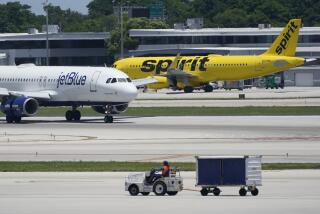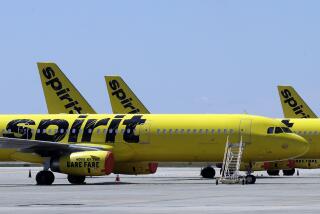Mergers Still Probable for United, US Airways
- Share via
The apparent end to plans by UAL Corp.’s United Airlines to buy US Airways Group Inc. drew a collective sigh of relief Monday from their chorus of critics, including consumer advocates, rival airlines, lawmakers, travel agents and many of the companies’ workers and stockholders.
But this is hardly the final destination for either airline. Even if this deal officially collapses, both carriers probably will attempt mergers again, analysts said.
That keeps intact the prospect that ultimately only three or four major U.S. airlines will control the skies.
It was just that scenario that drew the ire of United-US Airways foes on grounds that fewer airlines would lead to higher consumer fares and lousier service.
In the meantime, consumer fares won’t necessarily stop rising. Despite some current summer sales, “fares will continue to go up” as many airlines try to offset the costs of lucrative contracts they’ve recently signed with their labor unions, said Michael Boyd, head of an aviation consulting firm bearing his name in Evergreen, Colo.
Those new contracts aren’t the airlines’ only problem. The entire industry is suffering from the economic slowdown, dramatically illustrated by a steep falloff in lucrative business travel. Most major carriers are expected to report weak earnings for the second quarter.
If United had swallowed US Airways, many speculated that a domino effect would be triggered, with Delta Air Lines, Northwest Airlines and Continental Airlines making merger proposals of their own to stay competitive. But they refrained from inking any deals pending the outcome of the United-US Airways merger, which they lobbied hard to block.
AMR Corp.’s American Airlines did not wait, purchasing bankrupt Trans World Airlines in April. That enabled American to end United’s long-running role as the biggest U.S. carrier, and vastly strengthened American’s role as a major provider of East-West service.
Any additional airline mergers probably won’t happen right away, because the Justice Department’s antitrust regulators are indicating that they’re not wild about having fewer major airlines--at least at the moment.
On Monday, United and US Airways confirmed that they’re looking to scrap their $4.3-billion merger and declined to offer details.
United, based in Elk Grove Village, Ill., reportedly is ready to pull out of the US Airways deal in the face of regulators’ ongoing objections, especially about United’s potential concentration in the Washington area.
Three years ago, the Justice Department effectively scuttled a quasi-merger between Northwest and Continental in which Northwest had acquired a controlling voting stake in the other airline.
“The regulators have sent a clear signal, both with what they did with the Northwest/Continental deal, and in this case that they’re uncomfortable with major industry consolidation at this point,” said Ray Neidl, an analyst with investment firm ING Barings in New York.
The American-TWA deal was an exception, observers said, because it was clear that TWA would not survive flying solo.
“Consumers, communities and businesses should be relieved” by the Justice Department’s position, said Kevin Mitchell, chairman of the Business Travel Coalition, an advocacy group.
The airline industry, he said, should spend less time worrying about mergers and more time fixing “aviation system gridlock, eroding customer service levels and record-level business air fares,” he said.
That’s been one of the critics’ major gripes: While carriers are fretting about finding merger partners, air travelers keep facing ever-growing delays and congestion. United, especially, has been excoriated for being unable to efficiently operate its existing routes.
(But U.S. air travel appears to be improving somewhat: On Monday, the Transportation Department’s latest air travel report showed that delays and flight cancellations declined in May, and there were fewer complaints about service and mishandled baggage.)
In addition to antitrust concerns, organized labor also makes airline mergers hard to complete. Melding two groups of unionized pilots, mechanics and other workers--while protecting their seniority, work rules and wages--is a challenge.
Although the unions at United and US Airways were not in a position to block that merger outright, some of them--including both carriers’ pilots unions--had major reservations about the deal. That could have translated into prickly labor relations and reduced customer service.
But Neidl and others said more airline mergers are inevitable in the years ahead, especially if the United States one day relaxes its laws blocking a foreign airline from owning more than 25% of a U.S. carrier. That would pump added competition into the U.S. market, making mergers less of an antitrust threat, they said.
Even before that happens, United probably will make another move to regain its position as the biggest U.S. airline, some suggested.
Losing the US Airways deal “is a temporary setback,” said James Peppe, an analyst with OneTravel.com, an Internet travel and consulting firm.
“We think the impetus for consolidation still exists, and United will not just sit back and allow American Airlines to be No. 1,” he said. “They’re [United] used to that position.”
Arlington, Va.-based US Airways, meanwhile, now must try to prosper as a stand-alone airline--and it won’t be easy. The sixth-largest airline, US Airways suffers from high labor costs, lack of a national route network and major financial losses.
The collapse of the United deal marks one of the rare times US Airways Chairman Stephen Wolf, who’s made a career of running troubled air carriers and then selling them, has failed to close a deal. Wolf previously ran United itself, along with Republic and Flying Tiger.
But US Airways’ investors already had signaled their displeasure with the merger. Although UAL offered $60 for each US Airways share, US Airways’ stock has lately traded for only half that price, and Monday it plummeted $3.41, or 14%, to close at $20.89. UAL’s shares slipped 45 cents to $34.70. Both trade on the New York Stock Exchange.
More to Read
Inside the business of entertainment
The Wide Shot brings you news, analysis and insights on everything from streaming wars to production — and what it all means for the future.
You may occasionally receive promotional content from the Los Angeles Times.











